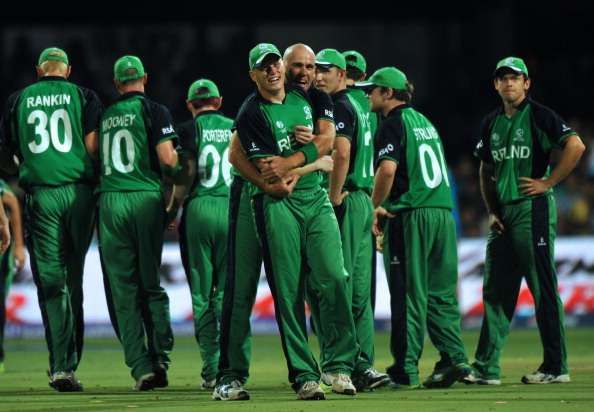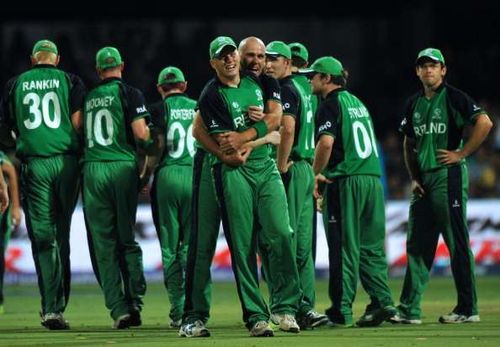
How Ireland went from almost attaining Test-playing status to failing to qualify for World T20 2016

Back in 2007, the Ireland cricket team pulled off one of the most miraculous upsets in the history of associate nations. They bowled Pakistan out for a paltry 132 at Sabina Park in the World Cup and easily chased down the target.
Trent Johnston, the then Irish captain, had fired up the side by remaining the players the stakes involved if they lost: they would have to return to their mundane jobs as farmers, postmen, and teachers. "I sure as hell don't want to go back and sell fabric," he told his team, as recorded in Batmen - The Story of Irish Cricket.
Fast forward to 2016 and Ireland have, after a disastrous campaign, failed to even qualify for the World T20 2016. The qualifiers saw Ireland register losses to Hong Kong, Papa New Guinea, Netherlands, UAE and even Oman.
As humbling and confounding as these defeats might apparently seem to be, there is a deeper reason for Ireland's failure here. Ireland's story so far has been that of relentless striving towards attaining Test status in the face of tiring, aspirational players and quixotic decision-making by the ICC.
"We did neglect T20, not through wish, but through resources and prioritising. Yes, we're probably paying the price for that now," admits Cricket Ireland performance director Richard Holdsworth. "Our goal of Test cricket is still very much the primacy of the organisation."
While associate nations like Afghanistan have taken the world by storm after their performances in the World T20 2016, it is still a long shot for them when it comes to playing Test cricket. While Ireland have stubbornly stuck to fighting for a Test status, newer associate nations have made a name for themselves by excelling in the world of T20 cricket.
Even Ireland's head coach John Bracewell is mindful of that when he says: "A number of associates see T20 as their only opportunity to get to the world stage, and so are really concentrating and focusing their resources into that format."
The glorious years
2007 marked the arrival of Ireland on the big stage. Playing their inaugural world cup, Ireland with the O'Briens, Porterfield, Boyd Rankin, Johnstone, Mooney and Joyce was a team to watch out for. They played fearless cricket, won hearts and became the new poster boys. They exceeded expectations and returned home to a heroes' welcome.
The ICC had quite accidentally chosen to make Ireland an Associate member back in 1993. It was a kind of romantic, inexplicable move that can perhaps be best explained by the undone Irish love for sport.
James Joyce in The Portrait of the Artist as a Young Man had written: "In the soft grey silence he could hear the bump of the balls: and from here and from there through the quiet air the sound of the cricket bats: pick, pack, pock, puck: like drops of water in a fountain falling softly in the brimming bowl."
Irish greats like Colin Farrell, Samuel Beckett and even Jedward had all played cricket in Ireland. The legendary WG Grace had visited Ireland quite a few times one of the most notable occasions being in 1902 when his London County side was beaten by Ireland who were making their first-class debut.
If the World Cup in 2007 had been good for Ireland, 2011 was even more magical. When Kevin O'Brien walked in against England in the World Cup with his team at 106 for 4, no one foresaw the carnage that was to follow. Ireland needed 222 off the next 27.4 overs and just about every cricket pundit had written them off by then.
O'Brien clearly had other ideas. He embarked on a carnage like cricket had never seen -- 113 off 63 balls to chase down a ridiculously impossible target of 327. The record for the highest successful run-chase was firmly registered against their name. India went on to win the World Cup but right then, Ireland's was the story to write about.
Aspiring for Test status
Just when Ireland might have been dreaming about a more secure future through rose-tinted glasses, disaster struck. Even after Ireland had pulled off that impossible run-chase, ICC ended up announcing that only Test-playing nations would feature in the next World Cup. The decision was met with vehement opposition from the associates and was later partially revoked. But it was enough to mar the spirit of temporary success.
In any case, Ireland were pushing hard to attain Test-playing status. Fiercely ambitious with utmost respect for the grand tradition of the game, Test cricket was what the Irish cricketers aspired to play.
"I often have dreams, going to bed, of playing Test cricket at Lords. So hopefully that dream will become a reality," Niall O'Brien had told CricketEurope.
Their aspiration was met with widespread approval including that of former cricketing greats who believed that the first step that the ICC should take to save Test cricket would be to include teams like Ireland.
Speaking to All Out Cricket, Jason Gillespie had said, "One fantastic way to give Test cricket a lift straight away would be to give Ireland Test status," said Gillespie.
"It is something that should happen sooner rather than later from the ICC. Imagine if Ireland were given Test status. That would be huge news in world cricket, and it would be a massive positive story for the world game. The ICC and all the national boards talk a lot about the importance of protecting the integrity of Test cricket. If it is that important, then we should look to improve it, and in my view including Ireland would improve it."
"Ireland are ticking all the boxes. They've punched well above their weight in limited-overs tournaments," added Gillespie. Think of the list of names who've plied their trade in English domestic cricket and who have even played for England. It would make a decent Test side."
Their push for full membership and the Test status was fuelled by a hugely ambitious chief executive, Warren Deutrom, who was prepared to undergo the rigorous processes and not lose hope.
"There's a long way to go," Deutrom told Cricinfo's Switch Hit podcast. "Traditionally, applications have taken two, three or more years. There are clearly a large number of hoops we have to jump through. In terms of challenges that are facing us, yes, there is clearly an awful lot of work we need to do just to fulfill the compliance and existing criteria.
"It perhaps sets in motion a process that allows others to see the levels they need to reach in order to fulfill the same ambitions. It shouldn't be easy. Test cricket is regarded as the pinnacle of the game and it's quite right that those trying to ascend to Test cricket, or just Full Membership without necessarily involving Test cricket, have to ensure that they are coming up to some pretty rigorous criteria."